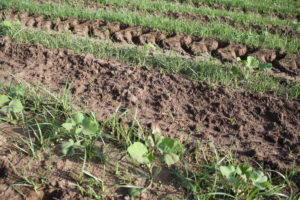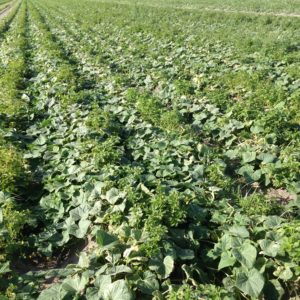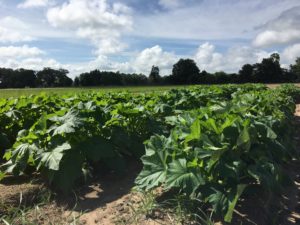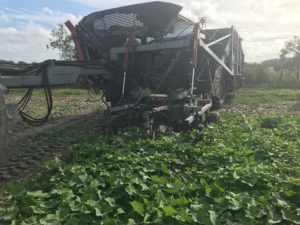Researchers are conducting trials through IR-4 Project to determine the weed control effectiveness of clomazone as a post-transplant application.

Clomazone has become an important weed control tool for specialty crop growers. This pre-emergent herbicide provides effective control of many annual grasses and common broadleaf weeds. Through the IR-4 Project, researchers are now studying whether this herbicide can be used as an effective post-transplant weed control treatment for cucumber and summer squash.
For the last two years, University of Florida horticulture professor and weed specialist Peter Dittmar has been conducting efficacy trials with clomazone on cucumber and summer squash to expand the herbicide label to include post-transplant applications. Clomazone has already received pretreatment application through IR-4 for these two crops. Dittmar, who is director of the North Florida IR-4 field lab, is working with Stanley Culpepper, professor and extension weed scientist at University of Georgia, and Roger Batts, IR-4 field research director, Herbicide Development and Registration, at North Carolina State University.
“This research is being conducted to expand the label beyond what was done previously through IR-4 to register clomazone as a pre-plant, pre-emergent herbicide,” Dittmar said. “The proposed label change would enable cucumber and squash growers to apply clomazone as a post-transplant treatment. We are doing research on the crop tolerance and weed control for the label expansion. This would be an important label change since the number of post-transplant control treatments for these crops is limited.”
Determining the best time of application
When clomazone is applied as a pre-plant treatment, cucumber and squash growers will prepare the beds and then apply the herbicide. Dittmar said growers typically apply clomazone, which has a 24-hour re-entry interval, the day before the beds are planted.

Dittmar is currently conducting post-transplant efficacy studies with cucumber and summer squash at a University of Florida research farm.
“We are collecting efficacy data to show that there is excellent crop tolerance before any residue trials would be conducted,” he said. “We are looking at three different rates applied at one, three and five days after transplant. We are trying to determine the most effective application timing.
“Application of clomazone has to be done quickly after transplanting because once transplants are put in the ground the weed seeds will start to germinate. Because clomazone has limited post-emergence activity, the later the application after transplanting the more weed seeds can germinate. There is a decrease in weed control once the transplants have been in the ground for five days. Clomazone efficacy is good for controlling weeds before they germinate and emerge.”
Although specialty crop growers have been involved with trials for the label expansion of pesticides, fungicides and herbicides, Dittmar said he is not working directly with any commercial growers for the clomazone post-tranplant studies.
“The post-transplant label expansion is brand new so I am doing most of the trials,” he said. “This ensures that if there is any crop injury no growers are suffering any losses. Since the application is also off-label, growers also would not be able to sell the produce because it is an off-label pesticide use. When clomazone receives a label expansion for post-transplant treatments, then I will do a lot of on-farm demonstrations to show growers how to properly make the applications.”
Avoiding resistance to clomazone
Because there are few pre-emergent herbicides that can be rotated with clomazone, Dittmar has concerns about the development of resistance.

“Cucumber and squash growers have few options when it comes to pre-plant weed treatments,” he said. “That is why clomazone has become the standard. There are more options for post-transplant applications, but not many. Pre-plant treatments are where growers will continue to use clomazone the most.
“Many Florida specialty crop growers either have row crop rotations or they have neighbors who grow row crops. Resistance is always a concern. One of the good things about clomazone is that the only documented case of resistance is with Johnsongrass in rice. But growers are always thinking about it.
“There is resistance to the herbicide Paraquat because it is used a lot in row crop weed control. That is where specialty crop growers are most aware of weed resistance. Growers are aware that clomazone resistance could occur so they are trying to do other things in order to limit resistance.”
Many cucumber and squash growers in Florida are using cultural practices including laying plastic mulch to suppress weeds.
“They are using plastic mulch because it provides excellent control of grass and broadleaf weeds,” Dittmar said. “If growers are planting on bare ground they can also use mechanical or manual cultivation to control weeds. Most growers are doing cultivation mechanically because labor is so hard to come by. For cultivation, growers are limited to the first three to four weeks to avoid damaging the plants.”
Crop rotation is another option specialty crop growers can use to avoid herbicide resistance.

“In regards to crop rotation, it depends on what end of the state a grower is located,” Dittmar said. “Large growers are rotating with tomatoes and bell peppers. Medium- and small-sized growers who operate community-supported agriculture (CSA) programs or roadside stands and have less acreage can rotate any type of crop. They have fewer numbers of acres but usually have a more diverse crop mix. They may be rotating with cabbage or broccoli. There are a lot of growers in northern Florida who are producing carrots.”
Dittmar said another reason for avoiding herbicide resistance is because weeds can act as reservoirs for plant pathogens [https://edis.ifas.ufl.edu/hs1335] and insect pests.
“Many of the broadleaf weeds controlled by clomazone can act as hosts for pathogens,” he said. “More importantly than the diseases, weeds can act as reservoirs for nematodes. Almost all of the grass weeds growers need to be concerned with can serve as alternative hosts for root knot and awl nematodes. Clomazone is a very effective active ingredient for grass control which can help reduce the nematode populations.”
For more: Peter Dittmar, University of Florida, Horticultural Sciences Department, Gainesville, Fla.; pdittmar@ufl.edu; https://edis.ifas.ufl.edu/pdffiles/WG/WG02900.pdf.
PR# 06835 Squash/Cucmber (Grass/Broadleaf weeds)
PR# 03571 Squash/Cucumber (Annual weeds)
David Kuack is a freelance technical writer in Fort Worth, Texas; dkuack@gmail.com.
